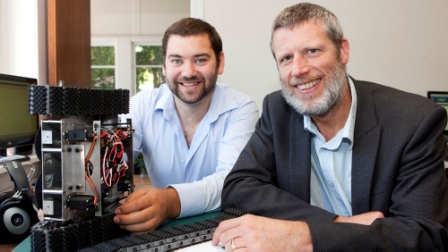
Invert Robotics CEO James Robertson shows the University of Canterbury Vice Chancellor Dr Rod Carr how the climbing robots work. Photo courtesy University of Canterbury
Invert Robotics
Robots are now able to climb a range of industrial surfaces, thanks to the development of a non-contact adhesion pad (NCAP), powered by compressed air.
Invert Robotics is the company formed to commercialise this breakthrough by University of Canterbury’s Director of Mechatronics Engineering, XiaoQi Chen. As well as investing in Invert, powerHouse has worked closely with CEO James Robertson and his growing team to secure intellectual property protection, prototype its mobile robots, and win customer trials.
One excellent practical application for this technology is the inspection of food storage silos. Many silos are inspected annually to ensure there are no new weld cracks or defects that can harbour bacteria. This job is currently done by visual inspection. After filling out a mountain of safety paperwork, riggers set up ropes and scaffolding above the silo. Then inspectors are lowered inside, with somebody remaining outside as a safety precaution. Records must be kept of anything found. This makes silo inspection a hazardous, multiperson effort relying on the human eye. It is a job that a robot could do in thirty minutes, freeing up inspectors to interpret the wide range of data it collects.
Invert Robotics has prototyped an inspection robot capable of being remotely deployed into food storage silos, starting with the $250 million per annum dairy industry inspection market. Potential customers are impressed by the capability, with one saying that it will completely change the way they do tank inspections. It’s a worldwide niche market offering customers an easier, safer, faster and more precise way of completing necessary inspections.
The NCAPs make possible a whole platform of mobile robotic applications that can climb on vertical, inverted, rough or dusty surfaces not amenable to other methods.
Under powerHouse guidance, the technology has been further developed for new applications, which has led to a new patent and paid customer trials. Invert is now in growth mode, attracting new staff and developing the capability to provide a leading industrial surface inspection service.
Invert Robotics – Press article
